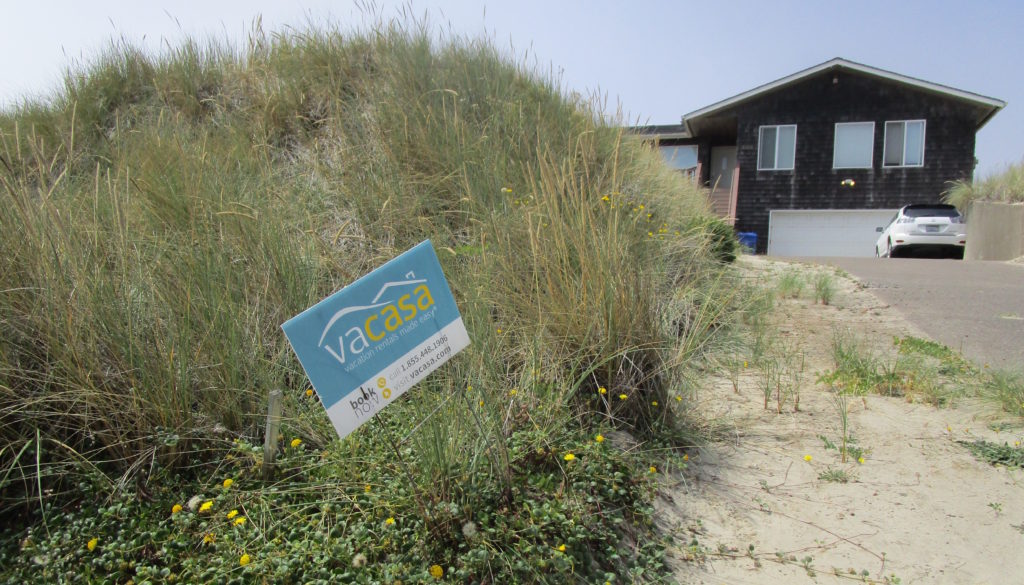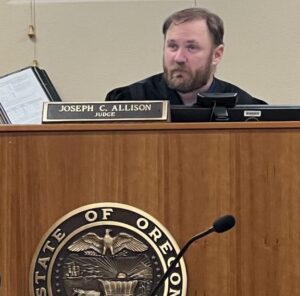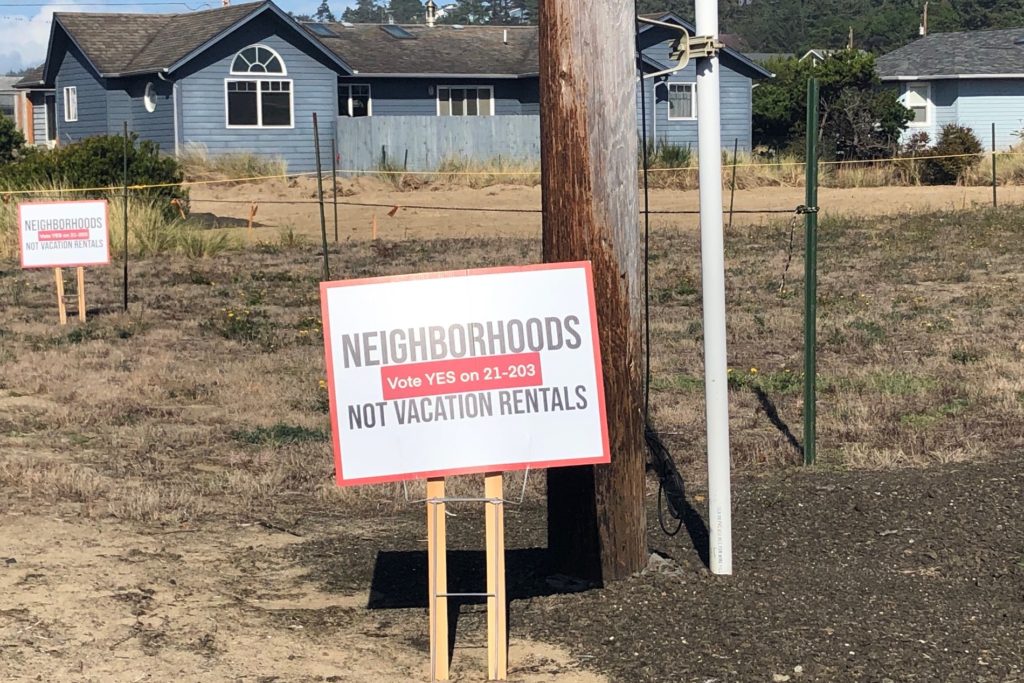
By QUINTON SMITH/YachatsNews
After more than a year of legal wrangling, a Lincoln County judge Friday ruled against vacation rental owners trying to stop a county ordinance regulating their properties as businesses and drastically reducing their number in unincorporated areas.
Friday’s ruling by circuit judge pro-tem Joseph Allison came a day after rental owners lost an appeal to the Oregon Court of Appeals asking justices to stop a county plan that created seven zones where the number of licenses could eventually shrink from 506 to 181.
Allison has twice stated in court that he expects the losing side to appeal his ruling. Over the weekend, both the county and a vacation rental lobbying group indicated exactly that.

The main focus of Allison’s ruling came as no surprise. At the end of a hearing Dec. 4, Allison said he planned to rule that the county ordinance regulating vacation rentals does not fall under Oregon’s land-use laws and the county can oversee them through its business licensing program.
The judge held a nine-minute hearing Friday morning and published his formal ruling late Friday afternoon.
Allison found two small parts of the county’s ordinance not to his liking. In his ruling, Allison “severed” two small parts of the ordinance and declared them invalid because he said they were unconstitutionally vague. The judge:
- Struck down a county prohibition of “events” at vacation rentals because the term wasn’t defined well enough; and
- Struck down an area of the ordinance delegating to the county counsel’s office the authority to appoint a hearings officer, create procedures and rules to hear complaints, violations and citations against vacation rental owners.
“Other than that, no injunction is granted,” Allison told attorneys during the brief hearing.
While Allison wrote in his ruling that the county appeared to be using its ordinance to regulate where business activity can occur, he said Oregon law allows the county to regulate vacation rentals through licensing and that Ordinance 523 is not a land use issue.
The Oregon Land Use Board of Appeals has twice agreed – sending challenges by vacation rental owners back to the circuit court saying they were not land-use issues.
On Thursday, the court of appeals agreed with a decision that the part of Ordinance 523 creating seven areas and limiting the number of vacation rentals in them was not in LUBA’s jurisdiction and rejected an appeal by vacation owners.
The judge’s ruling is certainly not the end of court hearings on an issue the county has been grappling with since 2016. Allison scheduled another status hearing for Monday, Jan. 8 but it was unclear what it was intended for. Allison is a Newport attorney working under contract as a temporary judge under a state contract to help Lincoln County circuit court with its caseload.
Both the county and Via Oregon, a lobbying group organizing vacation rental owners to challenge the county ordinance, said in statements to YachatsNews they would appeal portions or seek clarification of Allison’s ruling from the court of appeals.
County commissioners said they “disagree with the circuit court opinion invalidating the events clause and informal hearings section of ordinance 523 and will be filing an appeal.”
Via Oregon said it would seek “clarification from the Court of Appeals as to which body has jurisdiction under the Oregon statutes designed to protect homeowners from retroactive laws enacted by counties,” the group said in a statement to YachatsNews.
15Neighborhoods, which has been an intervener in some of the legal challenges and which put a successful measure on the November 2021 ballot, hailed the ruling.
“This industry has filed and lost a bewildering number of lawsuits against Lincoln County since the election of November 2021, when 60 percent of the voters said yes to a five-year phase out of short term rentals,” its statement said. “Multiple filings are a litigation strategy. Faced with the prospect of defending against multiple lawsuits, rural counties often capitulate. Thanks to voters, Lincoln County commissioners know their constituents want significant regulation of this industry. While the STR ordinance the county is defending falls short of the ballot measure’s phase out, it is much more restrictive than the compromise ordinances passed in Tillamook and Clatsop counties.”
The county is paying two Portland land-use attorneys to defend the ordinance, which so far has cost $295,000.

The history
The ordinance is a six-year-long attempt by county commissioners to get a handle on the growing number of vacation rentals in unincorporated areas.
Commissioners struggled for years to work out regulations and to put an ordinance in place. That led to a citizen-led ballot measure in November 2021 to phase out vacation rentals in residential neighborhoods. Commissioners tried unsuccessfully to undercut it by passing a number of changes to an existing ordinance just days before voters resoundingly approved it.
A coalition of property owners appealed both the ballot measure and the updated county ordinance to the Oregon Land Use Board of Appeals, contending both were land-use measures.
LUBA ruled in 2022 that the voter-approved ballot measure conflicted with Oregon land-use law and declared it invalid. But LUBA twice said the county’s revised ordinance was not a zoning or land-use issue, that it had no jurisdiction over it and sent the rental-owner’s lawsuit back to circuit court.
Vacation rental owners appealed one of the LUBA decisions to the Oregon Court of Appeals, which heard oral arguments Dec. 4. In that case, rental owners challenged part of the county ordinance that created seven geographic areas – or zones – where they then set specific densities and numbers for the number of vacation rental licenses. On Thursday, the court issued a brief ruling that it agreed with LUBA that the issue belonged in circuit court.
Vacation rentals in unincorporated areas once numbered more than 600. Now there are 506, after the county prohibited the transfer of licenses to new owners and put a moratorium on issuing new ones in most unincorporated areas. Under the county’s latest ordinance, they are supposed to eventually drop to 181 in five designated areas outside of the seven cities in Lincoln County.
- Quinton Smith is the editor of YachatsNews.com and can be reached at YachatsNews@gmail.com




Great decision. I’m a homeowner in Bayshore and would disagree with the statement made here that the issue has “split” our neighborhood. I believe the majority of us in Bayshore, voted for the ballot measure and support this latest ruling. A majority means what it says. In Bayshore, the opposition is a minority. A split implies equal division. Several STR owners sit on our governing board and at least one of those is co-funding the rental owner’s legal challenges, which is draining our very modest county budget of funds that could better be applied elsewhere. On a side note, just during this New Years’ weekend I saw illegal fireworks set off on my street, a noisy police action with a K-9 unit at an STR, overcrowding – 6 cars at least at 2 STR’s. Property rights the STR’s argue? How about property “responsibilities”?
Thank you to Judge Allison. And, Yachats News for posting the decision.
60% of voters no longer want unlimited short term rentals in their neighborhoods. Too many people purchase property to make it a small business (overnight rentals). I purchased my property to be my home. I never intended to live in hotel district, yet half of my neighborhood has turned into just that. I know many who keep purchasing multiple family homes never intending to occupy. Doesn’t seem right
Good for Lincoln County and the locals for stepping up to the vacation rental owners. Housing on the coast is scarce and locals don’t have any options for housing because of all the houses being used for vacation rentals. In my opinion it’s wrong to the locals to be homeless or living in trailers or living with family members because there just isn’t any housing available. What is worse is the those houses are empty most of the winter and it’s just a waste of housing for people who need it.
Thank you Judge! It’s so incredibly hard to find rentals. The homeless epidemic is I believe fueled by STR’s. This used to be my business on Maui renting them and cleaning them, then I lost two of my homes because of landlords turning them into STR’s. It’s awful what they are doing to communities. Thank you for helping those without a voice!
What is the point of separating residential and commercial activities under land use, only to issue business licenses that allow commercial activity in residential zones? It is an intellectually dishonest slight of hand, that nullifies community based land use in favor of tourist dollars.
And remember those so-called tourist dollars, at least the part for lodging, go to out of county investors or second homeowners and don’t really stay in the county’s economy.
And besides the noise, crowding, illegal parking and septic problems in summer, areas with a lot of STRs are virtual ghost towns in the winter. All those empty homes do nothing for the economy by sitting empty. They’re not filled with people who would live there full-time and buy gas, groceries, and other items in the county.
This isn’t my terminology but someone else quite accurately said that short-term rentals are an extractive industry.